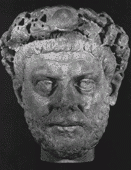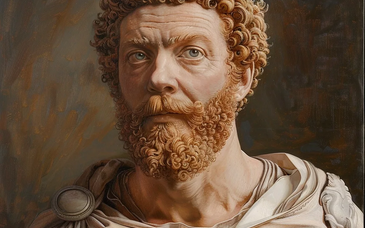
Lucius Domitius Aurelianus was born of poor parents on 9 September AD 214 in Lower Moesia.
His father was a tenant farmer of a wealthy senator Aurelius, after whom the family were named.
Aurelian rose through the ranks of the army, serving with distinction on the Danube frontier.
By AD 268, when Aureolus rebelled against Gallienus, he held a cavalry commanding north Italy.
It was in this role as cavalry commander that he took part in the siege of Mediolanum (Milan) led by emperor Gallienus. And there, outside Mediolanum, he became part of the plot to murder the emperor. In fact, he is credited with having had the idea of raising the alarm at night, which caused the emperor to rise from his tent and which provided the assassins with their opportunity to strike.
Aurelian was clearly a contender for the vacant throne after the assassination, but Claudius Gothicus was the preferred choice. This was mainly the case, due to Aurelian's reputation as a strict disciplinarian.
Claudius II Gothicus instead appointed him 'Master of the Horse' and perhaps the most powerful military figure in the empire.
When Claudius II died in AD 270, the throne controversially passed onto Quintillus, the late emperor's brother. It was very questionable if Claudius II Gothicus had truly named his brother heir to the imperial throne, but once more the preference of the army and senate of a less strict man than Aurelian made sure he did not become emperor.
Aurelian moved quickly. He was briefly distracted by an attack by the Goths, who besieged Anchialus and Nicopolis. But once he returned back to his base in Sirmium in August AD 270, he laid claim to the throne himself, stating that he, not Quintillus, had been intended for the throne by Claudius II Gothicus.
Nobody dared take on the strongest military figure of the empire, and quickly all the forces changed sides to this stern Danubian commander, abandoning a lonely emperor in Aquileia, who alas committed suicide.
Aurelian, now sole emperor, took to dealing with the most pressing military threat, the Juthungi (Jutes). They had crossed the Brenner Pass and invaded northern Italy. On hearing of Aurelian's marching towards them at the head of an army, the barbarians immediately began to withdraw. However Aurelian was quicker and the barbarians were caught up with and severely defeated before they escaped back across the Danube. Had the Romans earlier paid these barbarians subsidies to prevent them from attacking, then now Aurelian forced them to agree a treaty on his terms, without any subsidies.
Then Aurelian took to Rome, where the senate officially confirmed him as emperor. They were reluctant to do so, and yet they had no choice.
But Aurelian had no time to lose in Rome. Almost immediately thereafter Aurelian had to go north again, where this times the Vandals, joined by Sarmatians, had crossed the Danube. Aurelian moved decisively and defeated the barbarians in battle (AD 271). The Vandals were only allowed to move back home, after the emperor had asked his troops if they wished to let them do so. Only after this symbolic gesture, and having left hostages and supplied 2'000 horsemen to the Roman cavalry, were the Vandals allowed to withdraw back across the Danube.
And yet still the chaos of barbarian invasions continued. The Alemanni, Juthungi and Marcomanni invaded the empire in force, before even the Vandals had finished withdrawing. Once more northern Italy had to endure a force of barbarians descending upon it from the Alps.
Aurelian rushed back to Italy and met the barbarians at Placentia. But the legions were no match for the barbarians this time and Aurelian suffered a severe defeat (AD 271).
Wild rumours spread through Rome like wildfire. Riots ensued, no doubt encouraged by senators who sought to undermine Aurelian's authority as much as possible.
If Aurelian had suffered a setback, he was still far from beaten. The barbarians now made one crucial mistake. In order to cover more ground - and so reap more plunder - they split up their huge army into several smaller forces. This gave Aurelian the precisely the advantage he wanted. He moved on them and defeated these smaller armies one by one (AD 271). Very few of the barbarians managed to escape back across the Alps. Aurelian did not pursue them, for his presence was more urgently required in Rome.
The riots were still going on. Most of all that of the moneyers (coin makers) and their supporters who were holding out on the Caelian Hill. There was a suspicion (well possibly true) that they had been producing coins containing less precious metals than was required, creaming off the profits for themselves. When Aurelian arrived at Rome the riots were brutally crushed. Thousands died on the Caelian Hill alone, where the moneyers were crushed. But Aurelian, well knowing where much of the trouble had originated from, also had several senators put to death, or had their properties confiscated.
However, Aurelian was aware that essentially the troubles within the capital had been sparked off by the fear of invasion, Aurelian took to building a wall around his unprotected capital in AD 271 - the Aurelian Wall.
Had Aurelian hardly had any time to spare ever since his accession to the throne, then his reign was now troubled by usurpers. From AD 271 to early AD 272 Septimius rose in Dalmatia, Domitianus in southern Gaul, and also a certain Urbanus staged a rebellion elsewhere. However, it would be wrong to think of these rebels as a real threat. They were only minor pretenders who didn't last long.
Much more serious was the threat posed to the empire by great parts having been severed from it; in the west by the Gallic empire; and in the east by the Queen Zenobia of Palmyra.
Aurelian decided that both of these independent states should be destroyed, and first took to oversee the crushing of the Palmyra, by far the greater threat to his empire - as it controlled Egypt and its grain supply.
Already in the spring of AD 272 Aurelian set out for the east. On the way he drove marauding bands of Goths out of Thrace and then crossed the Danube and crushed the Goths in several large-scale battles.
Having now sufficient strength of authority, Aurelian announced the long overdue withdrawal from Dacia. Had Trajan conquered it and turned it into a Roman province it had ceased to be a practical territory long ago. The population was evacuated and resettled in two territories detached from Moesia and Thrace, which were called Dacia Ripensis and Dacia Mediterranea.
Such momentous decisions behind him, Aurelian continued on eastwards to deal with Zenobia. He marched through Asia Minor (Turkey) unchallenged. Only the city of Tyana resisted him (AD 272). Having conquered the town, he did not allow his troops to sack it, making it clear to any territories that their return to the empire would go without retribution. It was an inspired move, bringing several Greek cities and the entire province of Egypt back into the empire without a fight.
In Syria he defeated the main force of the Palmyrene army at Immae, 26 miles east of Antioch (AD 272). Soon after another victory at Emesa brought about the capitulation of Palmyra (AD 272). Zenobia was captured.
As Aurelian left for Europe, the defiant city of Palmyra staged another rising, slaughtering its Roman garrison. Aurelian, by then at the Danube campaigning against the Carpi, immediately moved back to Syria and captured the city. This time there was no clemency shown. Palmyra was systematically sacked, looted and destroyed.
The demise of Palmyra now left Aurelian free to deal with the Gallic empire. He proceeded to Gaul and defeated the army of Tetricus on the Campi Catalaunii (Châlons-sur-Marne) (AD 274).
In the briefest of time Aurelian had managed, in a breathless series of military campaigns, what none would have thought impossible. He had not only saved the empire form several serious invasions, but had reunited the imperial territories, re-established Roman authority along the empire's northern borders and stood unopposed as emperor of the civilized world.
If many of his contemporaries called him manu ad ferrum ('iron fist'), then the senate bestowed upon him the title restitutor orbis ('restorer of the world).
In a magnificent triumph he marched through the streets of Rome, the defeated Tetricus and his son of the same name and Queen Zenobia were paraded to the people.
The procession might have been humiliating to the three of them, but Aurelian showed unusual clemency for a Roman emperor. Tetricus was made governor of Lucania, his son was made senator and Zenobia was moved to Tibur (Tivoli) and was married to a wealthy Roman senator.
Alas Aurelian could put his mind to governing his empire, rather than simply fighting for it.
He revised the monetary system of the empire. The additional revenue from the recovered provinces, together with thorough reforms, was used to put the empire's treasury back on a sound footing. Also measures were introduced to reduced embezzlement, extortion and corruption among imperial and provincial administrations.
Teh price of bread in Rome was regulated. The free distribution of bread was reorganized and rations of pork, oil and salt were added to the dole. The bed of the Tiber was cleared and its banks were repaired. Elsewhere in Italy waste land was reclaimed. Indeed, under his rule, Rome was recovering some of its former splendour.
In late AD 274 Aurelian first dealt with disorder at Lugdunum (Lyons) and then went north to fight off an invasion of Raetia by the Juthungi (Jutes).
But this hard-headed military emperor still had great things in mind, in particular the re-conquest of Mesopotamia from the Persians. In the summer of AD 275 he set out towards Asia, gathering an army as he continued eastwards.
But in October or November at Caenophrurium, a small Thracian town between Perinthus and Byzantium, he discovered that his private secretary, a certain Eros, had lied to him on a minor matter.
Eros, fearful of what punishment his emperor might have in store for him, told several senior praetorian officers that the emperor sought to have them executed. Eros' deceit was successful and Mucapor, a Thracian officer of the praetorians, finally killed Aurelian.
Aurelian was buried at Caenufrurium. He had reigned for five years. In this time his achievements had been nothing less than colossal.
He was deified by the senate soon after his death.





